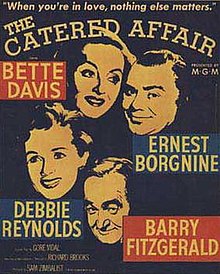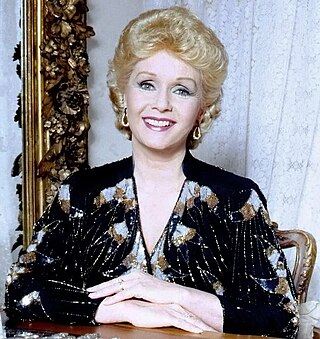
Mary Frances "Debbie" Reynolds was an American actress, singer, and businesswoman. Her career spanned almost 70 years. She was nominated for a Golden Globe Award for Most Promising Newcomer with her portrayal of Helen Kane in the 1950 film Three Little Words. Her breakout role was her first leading role, as Kathy Selden in Singin' in the Rain (1952). Her other successes include The Affairs of Dobie Gillis (1953), Susan Slept Here (1954), Bundle of Joy, The Catered Affair, and Tammy and the Bachelor (1957), in which her performance of the song "Tammy" topped the Billboard music charts. In 1959, she starred in The Mating Game and released her first pop music album, titled Debbie.

Gwyllyn Samuel Newton Ford, known as Glenn Ford, was a Canadian-American actor. He was most prominent during Hollywood's Golden Age as one of the biggest box-office draws of the 1940s, 1950s, and 1960s, who had a career that lasted more than 50 years.
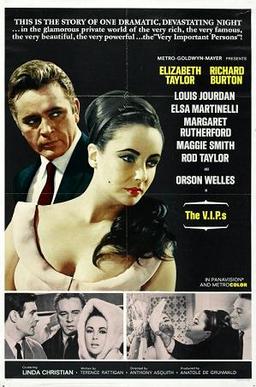
The V.I.P.s is a 1963 British comedy-drama film in Metrocolor and Panavision. It was directed by Anthony Asquith, produced by Anatole de Grunwald, and distributed by Metro-Goldwyn-Mayer. The film was written by Terence Rattigan, with a music score by Miklós Rózsa.

Hush...Hush, Sweet Charlotte is a 1964 American psychological horror thriller film directed and produced by Robert Aldrich, and starring Bette Davis, Olivia de Havilland, Joseph Cotten, Agnes Moorehead and Mary Astor in her final film role. It follows a middle-aged Southern woman, suspected in the unsolved murder of her lover from decades before, who is plagued by bizarre occurrences after summoning her cousin to help challenge the local government's impending demolition of her home. The screenplay was adapted by Henry Farrell and Lukas Heller, from Farrell's unpublished short story "What Ever Happened to Cousin Charlotte?"
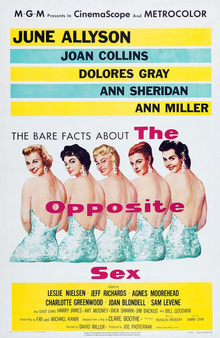
The Opposite Sex is a 1956 American musical romantic comedy film shot in Metrocolor and CinemaScope. The film was directed by David Miller and stars June Allyson, Joan Collins, Dolores Gray, Ann Sheridan, and Ann Miller, with Leslie Nielsen, Jeff Richards, Agnes Moorehead, Charlotte Greenwood, Joan Blondell, and Sam Levene.

These Old Broads is a 2001 American made-for-television comedy film directed by Matthew Diamond, written by Carrie Fisher and Elaine Pope, and starring Fisher's mother Debbie Reynolds, as well as Shirley MacLaine, Joan Collins, and Elizabeth Taylor in her final film role. In a 2001 BBC Omnibus documentary about Taylor, MacLaine says that Julie Andrews and Lauren Bacall were originally planned to be in the film. The role of Miriam Hodges was originally offered to June Allyson, who ended up in a cameo instead. The film premiered on February 12, 2001 on ABC.

Payment on Demand is a 1951 American drama film directed by Curtis Bernhardt and starring Bette Davis and Barry Sullivan. The screenplay by Bernhardt and Bruce Manning chronicles a marriage from its idealistic early days to its dissolution.
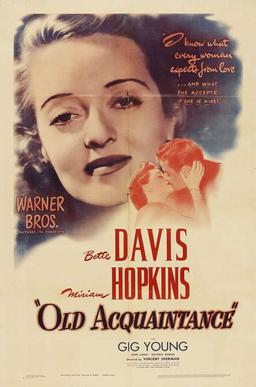
Old Acquaintance is a 1943 American drama film released by Warner Bros. It was directed by Vincent Sherman and produced by Henry Blanke with Jack L. Warner as executive producer. The screenplay by John Van Druten, Lenore Coffee and Edmund Goulding was based on Van Druten's 1940 play of the same title.
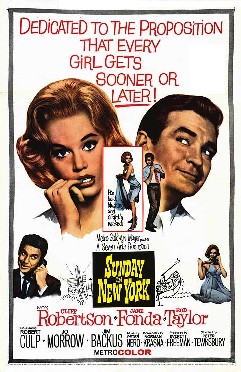
Sunday in New York is a 1963 American romantic comedy film directed by Peter Tewksbury from a screenplay by Norman Krasna, based on Krasna's 1961 play of the same name. Filmed in Metrocolor, the film stars Cliff Robertson, Jane Fonda, and Rod Taylor, with Robert Culp, Jo Morrow, and Jim Backus. The score was composed and recorded by Peter Nero, who also appears as himself performing in a nightclub; Mel Tormé sang the title song.
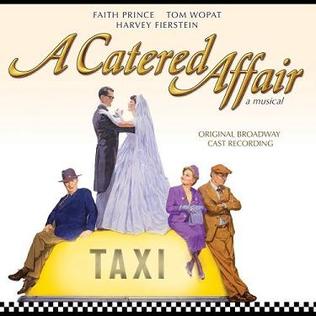
A Catered Affair is a musical with a book by Harvey Fierstein and music and lyrics by John Bucchino. It is based on both the 1956 film The Catered Affair written by Gore Vidal and the original 1955 teleplay by Paddy Chayefsky, set in 1953 in the Bronx. This is the first of Bucchino's scores produced on Broadway.

June Bride is a 1948 American comedy film directed by Bretaigne Windust. The screenplay, which was based on the unproduced play Feature for June by Eileen Tighe and Graeme Lorimer, was nominated for the Writers Guild of America Award for Best Written American Comedy. The film starred Bette Davis and Robert Montgomery. The Warner Bros. release marked the screen debut of Debbie Reynolds, although her appearance was uncredited.

Phone Call from a Stranger is a 1952 American film noir drama film directed by Jean Negulesco from a screenplay by Nunnally Johnson, based on the 1950 novelette of the same name by I. A. R. Wylie. The film centers on the survivor of an aircraft crash who contacts the relatives of three of the victims he came to know on board of the flight. The story employs flashbacks to relive the three characters' pasts.

Bunny O'Hare is a 1971 American comedy film directed by Gerd Oswald, starring Bette Davis and Ernest Borgnine. The screenplay by Coslough Johnson and Stanley Z. Cherry focuses on a pair of senior citizens who, disguised as hippies, engage in a crime spree.
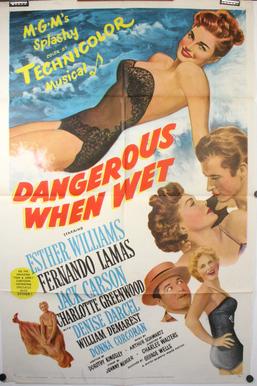
Dangerous When Wet is a 1953 American live-action/animated musical comedy film starring Esther Williams, Fernando Lamas and Jack Carson, directed by Charles Walters and featuring an animated swimming sequence starring Williams with the cat-and-mouse duo Tom and Jerry.

Raintree County is a 1957 American epic historical romance western film adapted from the 1948 novel of the same name by Ross Lockridge Jr. The film was directed by Edward Dmytryk and distributed by Metro-Goldwyn-Mayer. Set in the American South against the backdrop of the Antebellum South and the American Civil War, the film tells the story of a small-town Midwestern teacher and poet named John Shawnessy, who meets and marries a beautiful Southern belle named Susanna Drake; however, her emotional instability leads to the destruction of their marriage. The leading roles are played by Montgomery Clift, Elizabeth Taylor, Eva Marie Saint, Nigel Patrick and Lee Marvin.

I Love Melvin is a 1953 American Technicolor musical romantic comedy film directed by Don Weis, starring Donald O'Connor and Debbie Reynolds.

Meet Me in Las Vegas is a 1956 American musical comedy film directed by Roy Rowland, filmed in Eastman Color and CinemaScope, and starring Dan Dailey and Cyd Charisse. It was produced by Joe Pasternak for Metro-Goldwyn-Mayer.
The Concourse Plaza Hotel was a luxury hotel at Grand Concourse and East 161st Street in the Concourse neighborhood of the Bronx in New York City. Once the site of presidential campaign stops and host to major sports stars, it is now a senior citizens' residence owned and operated by the government of New York City.
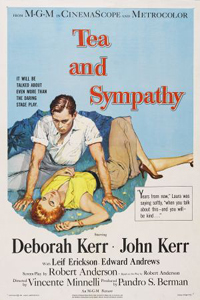
Tea and Sympathy is a 1956 American drama film and an adaptation of Robert Anderson's 1953 stage play of the same name directed by Vincente Minnelli and produced by Pandro S. Berman for MGM in Metrocolor. The music score was by Adolph Deutsch and the cinematography by John Alton. Deborah Kerr, John Kerr and Leif Erickson reprised their original Broadway roles. Edward Andrews, Darryl Hickman, Norma Crane, Tom Laughlin, and Dean Jones were featured in supporting roles.
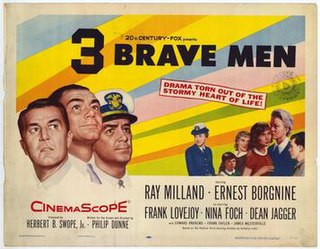
Three Brave Men is a 1956 American drama film directed by Philip Dunne and starring Ray Milland, Ernest Borgnine and Frank Lovejoy.
